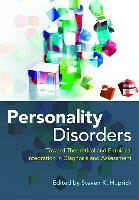Share
Fr. 139.20
American Psychological Association, Steven K. Huprich, Steven Ken Huprich, Steven K Huprich, Steven K. Huprich
Personality Disorders - Toward Theoretical Empirical Integration in Diagnosis Assessment
English · Hardback
Shipping usually takes at least 4 weeks (title will be specially ordered)
Description
Informationen zum Autor Edited by Steven K. Huprich Klappentext What are personality disorders? How should they be conceptualized, and how should they be assessed and diagnosed in clinical practice? For over a century these questions have been at the heart of psychological science. Yet even today, as the recent controversy over proposed changes to the classification of personality disorders in DSM-5 attests, there is hardly consensus on the answers. This groundbreaking text offers a comprehensive and provocative tour of a field that is ripe for integration. Contributors who rank among the world's most prestigious clinical and personality psychologists guide readers through the state of our knowledge of personality disorders, from conceptual and theoretical concerns to the practical problems faced by assessing clinicians. They address the advantages and disadvantages of categorical and dimensional approaches to diagnosing personality pathology used in the standard diagnostic manuals, as well as the "hybrid" model described in Section III of DSM-5. Recent advances in statistical, methodological, and biogenetic research strategies are applied to the study of personality disorders, with a focus on clinical and empirical approaches to assessment and diagnosis. Theorists describe how psychodynamic, attachment, interpersonal, evolutionary, and cognitive processing approaches offer surprisingly similar models of conceptualizing and treating personality disorders. Zusammenfassung Offers a comprehensive and provocative tour of a field that is ripe for integration. Contributors who rank among the world s most prestigious clinical and personality psychologists guide readers through the state of our knowledge of personality disorders, from conceptual and theoretical concerns to the practical problems faced by assessing clinicians. Inhaltsverzeichnis ContributorsIntroduction: Personality Disorders Into the 21st CenturySteven K. HuprichI. Current Issues in the Diagnosis and Assessment of Personality DisordersThe Value of Retaining Personality Disorder DiagnosesKenneth R. SilkA Critical Evaluation of Retaining Personality Categories and TypesDouglas B. Samuel and Sarah A. GriffinThe Role of Traits in Describing, Assessing, and Understanding Personality PathologyKristian E. Markon and Katherine G. JonasA Critical Evaluation of Moving Toward a Trait System for Personality Disorder AssessmentKevin B. Meehan and John F. ClarkinII. Research and Assessment StrategiesAt the Nexus of Science and Practice: Answering Basic Clinical Questions in Personality Disorder Assessment and Diagnosis With Quantitative Modeling TechniquesAidan G. C. Wright and Johannes ZimmermannLessons Learned From Longitudinal Studies of Personality DisordersAlex S. Keuroghlian and Mary C. ZanariniBiological Bases of Personality DisordersSusan C. SouthObject Relations Theories and Personality Disorders: Internal Representations and Defense MechanismsCaleb Siefert and Jonathan H. PorcerelliIntegrating Clinical and Empirical Perspectives on Personality: The Shedler–Westen Assessment Procedure (SWAP)Jonathan ShedlerAssessing Explicit and Implicit Processes in Personality PathologyIrving B. WeinerProcess-Focused Assessment of Personality PathologyRobert F. BornsteinIII. Moving Toward Integrated and Unified Models of Personality Disorders and PathologyAn Integrative, Psychodynamic Framework of Personality PathologyPatrick Luyten and Sidney J. BlattAn Integrative Attachment Theory Framework of Personality DisordersKenneth N. Levy, J. Wesley Scala, Christina M. Temes, and Tracy L. ClouthierAn Integrative Interpersonal Framework for Understanding Personality PathologyNicole M. Cain and Emily B. AnsellAn Integrating and Comprehensive Model of Personality Pathology Based on Evolutionary TheoryTheodore Millon and Stephen StrackThe Cognitive–Affective Processing System Model of Personality Pathology: Ready-Made for Theoretical IntegrationSteven K....
Product details
| Authors | American Psychological Association, Steven K. Huprich, Steven Ken Huprich |
| Assisted by | Steven K Huprich (Editor), Steven K. Huprich (Editor) |
| Publisher | American psychological assn |
| Languages | English |
| Product format | Hardback |
| Released | 19.01.2015 |
| EAN | 9781433818455 |
| ISBN | 978-1-4338-1845-5 |
| No. of pages | 452 |
| Subject |
Non-fiction book
> Psychology, esoterics, spirituality, anthroposophy
> Applied psychology
|
Customer reviews
No reviews have been written for this item yet. Write the first review and be helpful to other users when they decide on a purchase.
Write a review
Thumbs up or thumbs down? Write your own review.

